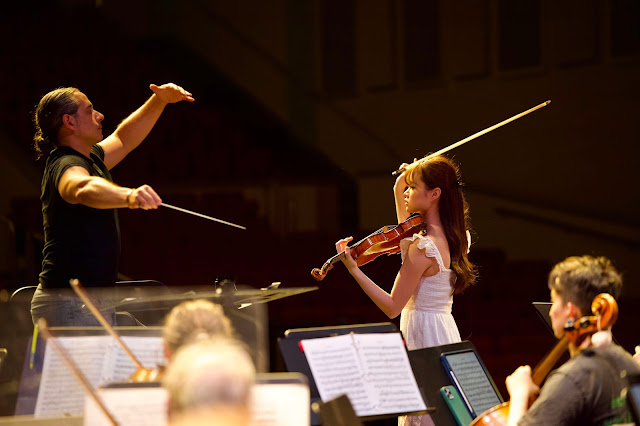This Saturday, March 29, I will have the pleasure of collaborating with violinist Elisa Jeon as our soloist in Sacramento for Ernest Chausson's Poème, with the Camellia Symphony Orchestra. I had the chance to ask Elisa some questions, and here are her answers:
Christian Baldini: Elisa, welcome! I look forward to performing this beautiful work with you, and I can't wait to share your talents with our audiences. Tell me, if you could describe Poème in one sentence, what would that be? And how do you personally interpret the overall character and emotional arc of this piece? Do you envision a particular narrative or imagery while performing this work?
Elisa Jeon: Thank you for having me! If I were to describe Poème in one sentence, I’d say it evokes a sense of unease and anguish, yet also feels lovestruck and dreamy, capturing the emotional intensity and complexity of a love story. Since Poème is inspired by Ivan Turgenev’s novella Le chant de l’amour triomphant, certain sections of the music bring to life the imagery and emotions of the narrative. As I perform, I’ll draw from these elements to convey the emotional journey of the love story through the music.
CB: What makes Poème so emotionally powerful? Is it the harmony, the phrasing, or something deeper?
EJ: Poème is so emotionally powerful because Chausson creates a unique sound world that’s both rich and intimate. The lush harmonies and the way he builds tension make the music feel like it’s constantly searching for something, which gives it a deeply emotional pull. The connection to violinist Eugène Ysaÿe, for whom the piece was written, is also key. Ysaÿe’s virtuosity really influenced how Chausson wrote for the violin, allowing for a personal, expressive interaction between the violin and the orchestra. That partnership helped shape a piece that feels both personal and universally moving.
CB: What is your approach to rubato in general, and in particular in the opening section of this piece? How do you shape the long phrases, and where do you prefer natural breathing points or slight hesitations?
EJ: My approach to rubato is about trying to imitate human emotion and, in some ways, speech. Just as our phrasing in conversation shifts depending on what we want to express, I bring that same flexibility to the music. In the opening of Poème, for example, I pay close attention to the emotional arc of each phrase. If I’m conveying longing, I might stretch a note or pause to let that emotion linger. Similarly, if the emotion is more urgent or intense, I’ll push forward slightly. It’s all about finding where those breathing points and hesitations feel natural, though it can take a bit of trial and error to discover the right moments and balance. It’s a constant process of listening and adjusting, and when it clicks, the music feels more alive and convincing.
CB: Who is your favorite violinist interpretation of Poème, and why?
EJ: Janine Jansen’s interpretation of Poème is my favorite, although there are many other wonderful performances to appreciate. This piece offers plenty of room for freedom, especially in the first two cadenzas, which gives each soloist a chance to make it their own. However, Jansen takes it to another level. I find her playing to be incredibly human, there’s a depth and sincerity in her phrasing that makes the already emotional piece even more profound. Every note she plays feels so intentional, and it’s almost as if she gives words to the music. There’s a daring quality to her performance, a kind of visceral emotion, and even a bit of attitude in how she approaches certain moments. That unique combination of intensity and boldness makes her interpretation stand out in such a compelling way.
CB: What is the meaning of music to you personally, in your life? How did it all start for you?
EJ: For me, music is about connection, it's a way to share something deeply personal and express emotions that words can’t quite reach. It’s also about creating beauty, whether on my own or with others. My journey started with piano, and then I picked up both piano and violin. But I ultimately chose the violin because I loved playing in orchestras and being part of that community. That’s what really kept me drawn to it.
CB: What's the best advice you've ever received from a mentor or teacher?
EJ: The best advice I’ve ever received is to have fun with the music! I used to get so caught up in hitting every note perfectly that I’d forget the most important thing… It's about making music, not just playing the right notes (although that’s important too). Once I started focusing more on the feeling and expression, everything opened up and became so much more rewarding and enjoyable.
CB: Thank you very much Elisa, we look forward to making music with you!
EJ: Thank you! I’m really looking forward to making music together and sharing this experience with all of you.
Elisa Jeon is an accomplished violinist currently pursuing her studies at the San Francisco Conservatory of Music. A dedicated performer, Elisa has earned recognition for her artistry through performances with prestigious ensembles, including the New World Symphony as a substitute violinist and the National Orchestral Institute Festival Orchestra under Marin Alsop, where she served as Assistant Concertmaster.
Currently studying with Chen Zhao of the San Francisco Symphony, Elisa continues to refine her craft, working toward a degree in Violin Performance.






.jpg)

.jpeg)
.jpeg)